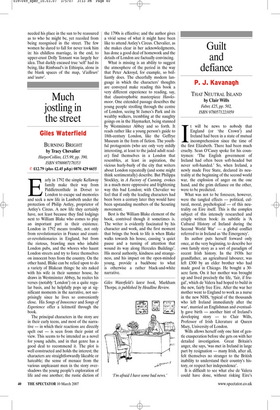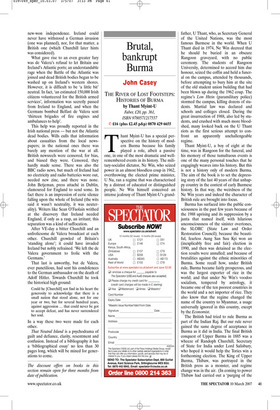Guilt and defiance
P. J. Kavanagh
THAT NEUTRAL ISLAND by Clair Wills Faber, £25, pp. 502, ISBN 9780571221059 It will be news to nobody that England (or ‘the Crown’) and Ireland had been in a state of mutual incomprehension since the time of the first Elizabeth. There had been much cruelty. Sean O’Casey spoke for his countrymen: ‘The English government of Ireland had often been soft-headed but never soft-handed.’ So, when Ireland, a newly made Free State, declared its neutrality at the beginning of the second world war, the explosion of anger on the one hand, and the grim defiance on the other, were to be predicted.
What was not to be foreseen, however, were the tangled effects — political, cultural, moral, psychological — of this neutrality on Eire itself. This is the complex subject of this intensely researched and crisply written book: its subtitle is ‘A Cultural History of Ireland during the Second World War’ — a global conflict referred to in Ireland as ‘the Emergency’.
Its author puts herself forward only once, at the very beginning, to describe her own family story as a sort of paradigm of recent Irish history. In the 1930s her grandfather, an agricultural labourer, was left £300 by an elder brother who had made good in Chicago. He bought a 30acre farm. On it her mother was brought up and lived precisely the life, ‘fair, if frugal’, which de Valera had hoped to build in the new, fairly free Eire. After the war her mother went to England to work as a nurse in the new NHS, ‘typical of the thousands who left Ireland immediately after the war’, married an Englishman and eventually gave birth — another hint of Ireland’s developing story — to Clair Wills, Professor of Irish Literature at Queen Mary, University of London.
Wills allows herself only one hint of gentle exasperation before she gets on with her detailed investigation. Great Britain’s anger, she says, ‘was met in Ireland in large part by resignation — many Irish, after all, felt themselves no stranger to the British inability to understand their country’s history, or respect her independence’.
It is difficult to see what else de Valera could have done, without risking Eire’s new-won independence. Ireland could never have withstood a German invasion (one was planned), nor, for that matter, a British one (which Churchill later hints was considered).
What gave rise to an even greater fury was de Valera’s refusal to let Britain use Ireland’s Atlantic ports; an understandable rage when the Battle of the Atlantic was joined and dead British bodies began to be washed up on Ireland’s western shores. However, it is difficult to be ‘a little bit’ neutral. In fact, ‘an estimated 150,000 Irish citizens volunteered for the British armed services’, information was secretly passed from Ireland to England, and when the Germans bombed Belfast de Valera sent ‘thirteen brigades of fire engines and ambulances to help’.
This help was proudly reported in the Irish national press — but not the Atlantic dead bodies. Wills culls that information about casualties from the local newspapers; in the national ones there was barely any mention of the war at all. British newsreels were censored, for bias, and biased they were. Censored, they hardly made sense. There was also the BBC radio news, but much of Ireland had no electricity and radio batteries wore out, needed new zinc, and there was none. John Betjeman, press attaché in Dublin, clamoured for England to send some. In fact there is an impression of eerie silence falling upon the whole of Ireland (the wits said it wasn’t neutrality, it was neuterality). Writers like Sean O’Faolain writhed at the discovery that Ireland needed England, if only as a rasp, an irritant; this separation was a kind of suffocation.
After VE-day a bitter Churchill and an unfrolicsome de Valera broadcast at each other. Churchill growled of Britain’s ‘standing alone’; it could have invaded Ireland but nobly refrained. ‘We left the de Valera government to frolic with the Germans.’ That last is unworthy, but de Valera, ever punctilious, had sent his condolences to the German ambassador on the death of Adolf Hitler. Towards Churchill he took the historical high ground:
Could he [Churchill] not find in his heart the generosity to acknowledge that there is a small nation that stood alone, not for one year or two, but for several hundred years, against aggression ... that could never be got to accept defeat, and has never surrendered her soul.
In a way these two were made for each other.
That Neutral Island is a psychodrama of guilt and defiance, clarity, resentment and confusion. Instead of a bibliography it has a ‘bibliographical essay’ no less than 30 pages long, which will be mined for generations to come.
The discount offers on books in this section remain open for three months from date of publication.



























































































 Previous page
Previous page